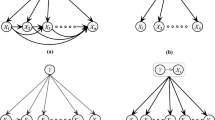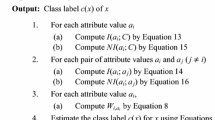Abstract
Averaged one-dependence estimators (AODE) is a type of supervised learning algorithm that relaxes the conditional independence assumption that governs standard naïve Bayes learning algorithms. AODE has demonstrated reasonable improvement in terms of classification performance when compared with a naïve Bayes learner. However, AODE does not consider the relationships between the super-parent attribute and other normal attributes. In this paper, we propose a novel method based on AODE that weighs the relationship between the attributes called weighted AODE (WAODE), which is an attribute weighting method that uses the conditional mutual information metric to rank the relations among the attributes. We have conducted experiments on University of California, Irvine (UCI) benchmark datasets and compared accuracies between AODE and our proposed learner. The experimental results in our paper show that WAODE exhibits higher accuracy performance than the original AODE.



Similar content being viewed by others
References
Bache K, Lichman M (2013) UCI machine learning repository
Cooper GF (1990) The computational complexity of probabilistic inference using Bayesian belief networks. Artif Intell 42(2):393–405
Dai Q (2013) A competitive ensemble pruning approach based on cross-validation technique. Knowl-Based Syst 37:394–414
Dai Q, Zhang T, Liu N (2015) A new reverse reduce-error ensemble pruning algorithm. Appl Soft Comput 28:237–249
Fawcett T (2006) An introduction to ROC analysis. Pattern Recogn Lett 27(8):861–874
Friedman N, Geiger D, Goldszmidt M (1997) Bayesian network classifiers. Mach Learn 29(2–3):131–163
Hand DJ (2009) Measuring classifier performance: a coherent alternative to the area under the ROC curve. Mach Learn 77(1):103–123
Heckerman D (2008) A tutorial on learning with Bayesian networks. In: Innovations in Bayesian networks. Springer, pp 33–82
Jiang L, Zhang H (2006) Weightily averaged one-dependence estimators. In: The 9th pacific rim international conference on artificial intelligence (PRICAI 2006: trends in artificial intelligence). Springer, pp 970–974
Jiang L, Zhang H, Cai Z (2009) A novel Bayes model: hidden naive bayes. IEEE Trans Knowl Data Eng 21(10):1361–1371
Kohavi R (1996) Scaling up the accuracy of naive-Bayes classifiers: a decision-tree hybrid. In: Proceedings of the 2nd international conference on knowledge discovery and data mining (KDD-96), pp 202–207
Kohavi Ron, Wolpert David H. (1996) Bias plus variance decomposition for zero-one loss functions. In: Saitta L (ed) Proceedings of the 13th international conference machine learning. Morgan Kaufmann, pp 275–283
Lee C-H, Gutierrez F, Dou D (2011) Calculating feature weights in naive Bayes with kullback-leibler measure. In: Proceedings of the 11th IEEE international conference on data mining (ICDM 2011). IEEE, pp 1146–1151
Lewis DD (1998) Naive (bayes) at forty: The independence assumption in information retrieval. In: Proceedings of the 10th European conference on machine learning. ECML ’98. ISBN 3-540-64417-2. Springer, London, pp 4–15
Lobo JM, Jiménez-Valverde A, Real R (2007) AUC: a misleading measure of the performance of predictive distribution models. Glob Ecol Biogeogr 17(2)
Orhan U, Adem K, Comert O (2012) Least squares approach to locally weighted naive Bayes method. J New Results Sci 1(1)
Partalas I, Tsoumakas G, Vlahavas I (2010) An ensemble uncertainty aware measure for directed hill climbing ensemble pruning. Mach Learn 81(3):257–282
Webb GI, Conilione P (2002) Estimating bias and variance from data. School of Computer Science and Software Engineering, Victoria
Webb GI, Boughton JR, Wang Z (2005) Not so naive Bayes: aggregating one-dependence estimators. Mach Learn 58(1):5– 24
Zaidi NA, Cerquides J, Carman MJ, Webb GI (2013) Alleviating naive Bayes attribute independence assumption by attribute weighting. J Mach Learn Res 14(1):1947–1988
Zheng F, Webb GI (2006) Efficient lazy elimination for averaged one-dependence estimators. In: Proceedings of the 23rd international conference on machine learning. ACM, pp 1113–1120
Acknowledgment
This work was supported by the Korea Creative Content Agency (KOCCA) grant funded by the Korea government (no. R2015090021).
Author information
Authors and Affiliations
Corresponding author
Rights and permissions
About this article
Cite this article
Xiang, ZL., Kang, DK. Attribute weighting for averaged one-dependence estimators. Appl Intell 46, 616–629 (2017). https://doi.org/10.1007/s10489-016-0854-3
Published:
Issue Date:
DOI: https://doi.org/10.1007/s10489-016-0854-3




